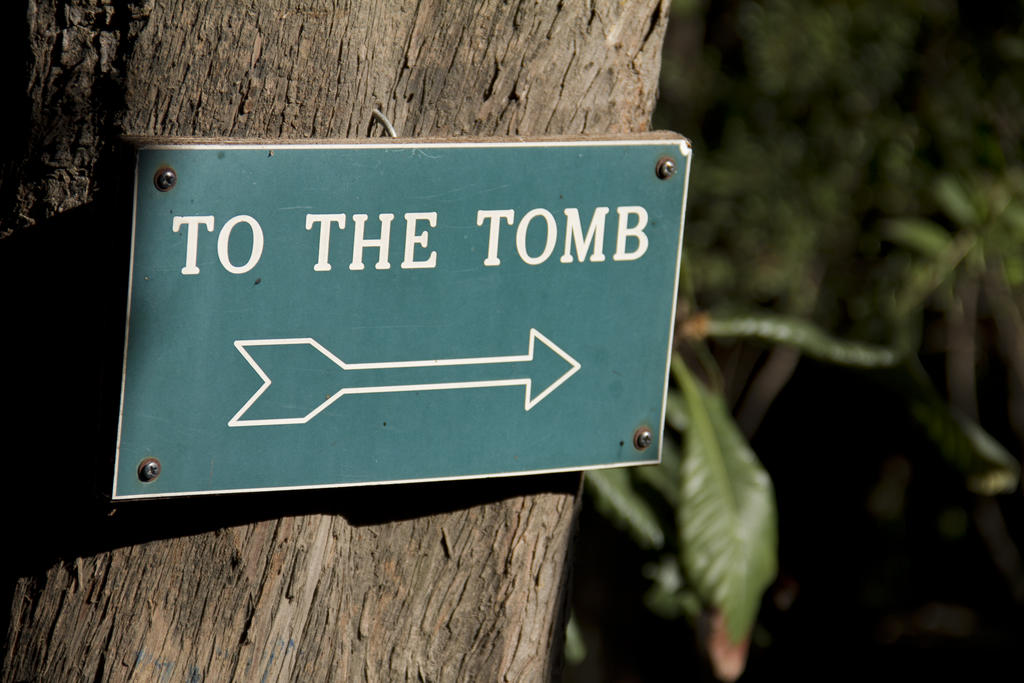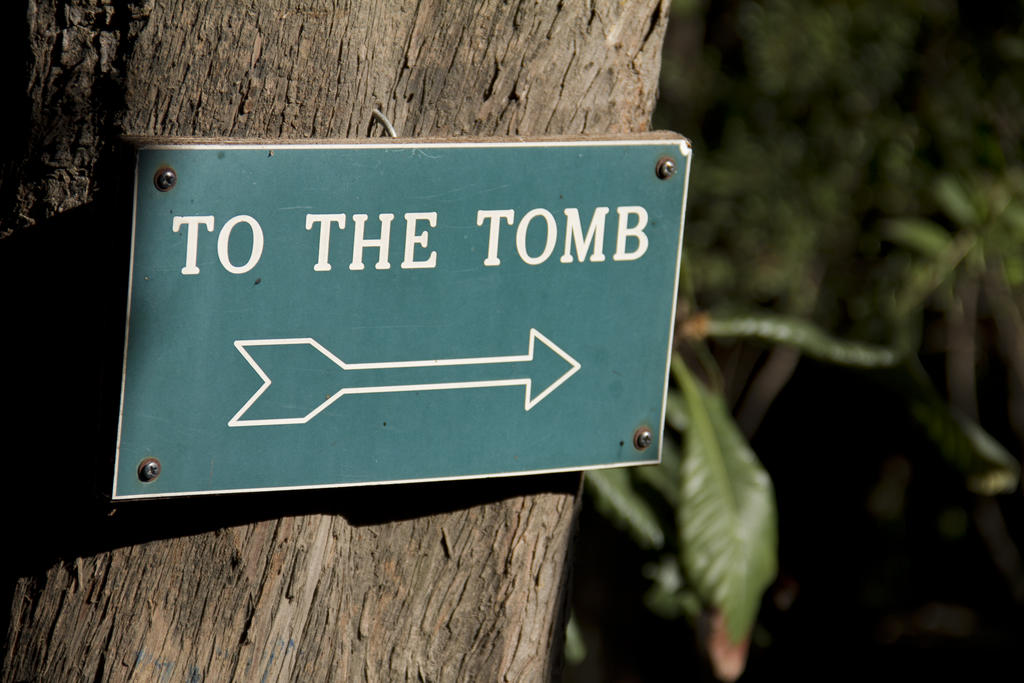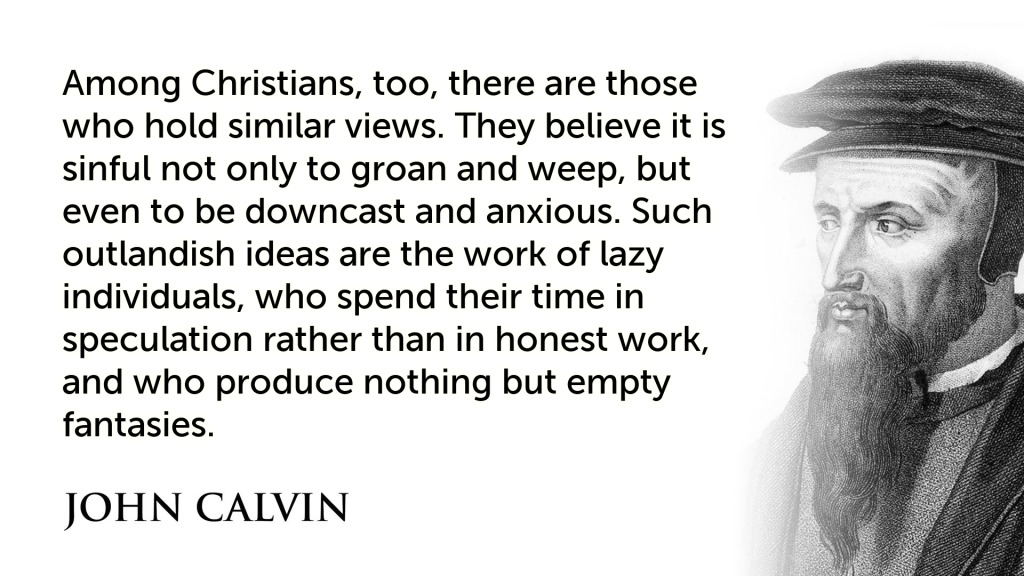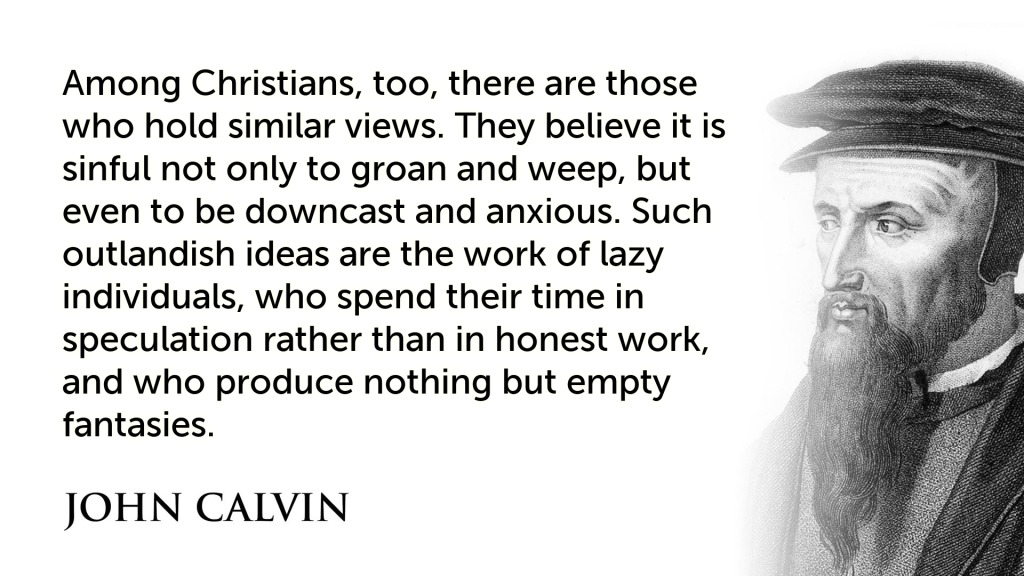What images and memories does the term Easter bring forth in your mind? For many of us, we can remember fondly events like Easter Egg hunts, gift baskets, and the like. Or perhaps less fondly, you remember being forced to take pictures with people in creepy giant rabbit costumes. Maybe you grew up in a home that went to church on Easter, so you remember singing songs, participating in reenactment plays as a child, and family meals after service.
Whatever your religious affiliation is or your exposure to Westernized Easter events has been, I think all of us have some sort of idea of the Christian resurrection story that Easter is based around. While you might not know or remember the details of this story, you know that there was a man named Jesus who died on a cross and three days later was raised to new life. At the root of this resurrection story is one central image: a large, incredibly heavy rolled-away stone and the empty tomb that it revealed.
What is the purpose of this empty tomb? Why was the stone rolled away? The answer for most of us is probably something like this: Jesus came back to life, got up, used miraculous strength to roll away the stone, and walked out of the tomb.Hence the rolled away stone and the empty tomb. But is that what really happened? Is that why the tomb was empty?
Immediately after the discovery of the empty tomb in John 20 we read of the first time Jesus appears to the disciples. Eight days later, Jesus again appears to the disciples in the same house. Both times, the author John goes out of his way to tell us that the doors of the house were locked, and yet Jesus suddenly appeared among them. Let that one bake your noodle for a second. The doors are locked, you’re surrounded by solid walls, and Jesus just physically appears amidst a group of people. We can debate the physics of this all we want – but the point is, solid objects couldn’t stop him.
So that begs the question, was the stone at the empty tomb really rolled away so Jesus could get out? Physical objects obviously were not a barrier for him. Had he wanted to, Jesus could’ve gotten up and left the tomb without ever having to roll away the stone.
When Simon Peter and John first showed up to the empty tomb, we read of how Simon Peter went in to the tomb and saw the grave cloths and the empty tomb for himself. You see, the stone wasn’t rolled away so that Jesus could get out, but so that we could get in.
When I asked you what images or memories the term Easter brought to your mind, what were they? Were they fond memories of celebrating with your family – memories such as church services, meals, holiday events, or dying eggs together? For many of us, there are no fond memories. Maybe it was just another day as any. Maybe you have sad and haunting memories of hypocritical parents who put on a good face at church but then came home and lived a life completely opposite of what they showed on Sunday morning. Maybe you didn’t have family meals and events because your family was so broken that a meal together was the last thing you ever would have done.
The first words of Jesus to his disciples after the resurrection were “Peace be with you” (John 20:19). Peace is a loaded term in our culture, but what Christ is talking about here isn’t a non-violent state of being between two or more parties. Peace is with us because his resurrection is proof that he alone has the power to bring true restoration, true healing, true beauty, true hope, true comfort and true love. Wherever you are this Easter Sunday, the empty tomb is for you. It is an invitation: come in and see that Christ has defeated death – just as he said he would. He has taken our shame and our guilt for us – just as he said he would. He has brought hope, comfort, and joy eternal – just as he said he would.
The tomb is empty, will you come in and see?
“Who do you say that I am?” This question may be one of the most well known lines Jesus ever spoke to his disciples. It is recorded in all three of the synoptic gospels (Matthew 16:13-16, Mark 8:27–29, Luke 9:18–20), and communicates a common theme amongst all four Gospel accounts. Even though Jesus was often clear about who he was and what he was sent to do, there was often confusion amongst the people about Jesus’ identity. Even the disciples, at times, were confused about what it meant for Jesus to be the Christ.
So who did people say that he was? It is clear throughout the Gospel accounts that the most common misconception people believed about Jesus was that he could either be John the Baptist or the second coming of Elijah. There was much confusion amongst the Jewish people over the roles of John the Baptist, Elijah, and the Messiah. What was the reason for this, and who was to blame? Is it significant? There is one conversation recorded in both Matthew and Mark that we can turn to that will help us answer our question.
The Transfiguration was a marvelous event that is again recorded in all three of the synoptic Gospels (Matthew 17:1-8, Mark 9:2–8, Luke 9:28–36). In all three accounts, the Transfiguration occurred immediately after Peter confessed that Jesus was the Christ. Yet, many people were still confused. Some said Jesus was really John the Baptist raised from the dead; others thought he might be Elijah or one of the prophets (Matthew 16:14, Mark 8:28, Luke 9:19). By all accounts there seems to be a bit of an identity crisis, and it centers on the role of the Elijah figure.
As soon as Jesus descended from the mountain at the Transfiguration, he commanded the disciples not to tell anyone until he had been raised from the dead. This command perplexed even Peter, who had just made his confident public confession. The disciples’ response to Jesus’ command holds the key to understanding their dilemma, “Then why do the scribes say that first Elijah must come? (Matthew 17:10)” The disciples had a problem with Jesus’ command because they knew the prophecy of Malachi 4:5-6, that Elijah would come and restore all things before the coming of the Messiah. This is what they had been taught by the scribes and religious leaders of their day. If Jesus is the Messiah, then that means the Elijah figure should have already come. If Elijah has already come, then all things should be restored – so why would Jesus still need to suffer and die?
There is a mixture of tenses used in Jesus’ response in verses 11 and 12, “Elijah does come, and he will restore all things.” The present tense in use (ἔρχεται) for an event in the past brings out continuing validity of the prophecy. The future tense (ἀποκαταστήσει) helps us see that a future aspect of the work was inaugurated, but is not yet finished. The use of the aorist (ἦλθεν) in verse 12, “But I tell you that Elijah has already come,” indicates that Elijah has already come in John the Baptist.
Jesus answers the disciples’ question by correcting and explaining the teaching of the scribes. Yes, the coming of a second Elijah would mean the restoration of all things, but these events would take place through the work of Jesus on the cross. Before all things would be restored, the Son of Man must suffer. It was not necessarily that the scribes were wrong, so much as they did not understand what it was that they were teaching. We see this in two ways.
The first is that while the scribes correctly taught Malachi 4:5-6, they were unable to recognize the one about whom the prophecy was written. Elijah has come, yet they (the scribes and religious leaders) did not recognize him. Secondly, while the scribes (somewhat) understood and taught the prophecies of Malachi, they did so at the expense of Isaiah’s prophecy regarding the suffering servant (Isaiah 53). Had the religious leaders attempted to understand the latter while also teaching the former, the roles of the Messiah and the Elijah figure may have been better understood.
One might be tempted to consider this whole situation as ironic were it not for the sovereignty of God working through the course of human history. For, as Christ himself notes, it is the very scribes who thought they were teaching Malachi 4:5-6 properly that ended up persecuting and allowing John the Baptist to be delivered to Herod (Matthew 17:12). And, as Jesus points out, it would be in a similar fashion that the Son of Man would also come to suffer. As Jesus’ disciples were unprepared for the suffering of the second Elijah, so too were they unprepared for the suffering of the Messiah. In a divine plan that only a sovereign God could carry out, those who were supposed to be closest to God became his instruments for saving those who were farthest from him.
There is often much confusion today about who Jesus is. The million dollar question, “Who do you say that I am?” is just as important for each of us to answer today as it was for Peter to answer 2000 years ago. Some say that he’s a good man, others say he’s a great moral teacher, and still others would claim he’s a complete fraud. Some “teachers of the law” would even have us believe that Jesus is a divine wish granter who is eager to meet our deepest desires. Yet, just as it was for Peter, may the confessions of our heart ring true: “You are the Christ, the Son of the living God.”
This excerpt is taken from The Collected Writings of John Murray, Vol. 2: Systematic Theology, Chapter 23.
This progression (of sanctification) has respect, not only to the individual, but also to the church in its unity and solidarity as the body of Christ. In reality the growth of the individual does not take place except in the fellowship of the church as the fellowship of the Spirit. Believers have never existed as independent units. In God’s eternal counsel they were chosen in Christ (Ephesians 1:14); in the accomplishment of their redemption they were in Christ (2 Corinthians 5:14-15; Ephesians 1:17); in the application of redemption they are ushered into the fellowship of Christ (1 Corinthians 1:9). And sanctification itself is a process that moves to a consummation which will not be realized for the individual until the whole body of Christ is complete and presented in its totality faultless and without blemish. This points up the necessity of cultivating and promoting the sanctification of the whole body, and the practical implications for responsibility, privilege, and opportunity become apparent.
If the individual is indifferent to the sanctification of others, and does not seek to promote their growth in grace, love, faith, knowledge, obedience and holiness, this interferes with his own sanctification in at least two respects. 1) His lack of concern for others is itself a vice that gnaws at the root of spiritual growth. If we are not concerned with, or vigilant in respect of the fruit of the Spirit in others, then it is because we do not burn with holy zeal for the honor of Christ himself. All shortcoming and sin in us dishonors Christ, and a believer betrays the coldness of his love to Christ when he fails to bemoan the defects of those who are members of Christ’s body. 2) His indifference to the interests of others means the absence of the ministry which he should have afforded others. This absence results in the impoverishment of these others to the extent of his failure, and this impoverishment reacts upon himself, because these others are not able to minister to him to the full extent of the support, encouragement, instruction, edification and exhortation which they owe to him.
We see, therefore, the endless respects in which interaction and intercommunication within the fellowship of the saints are brought to bear upon the progressive sanctification of the people of God. “If one member suffers, all the other members suffer with it; and if one member is honored, all the others rejoice with it” (1 Corinthians 12:26). The truth of our inter-dependence within the solidarity of the body of Christ exposes the peril and contradiction of exclusive absorption in our own individual sanctification. How eloquent of the virtue which is the antonym of independence and aloofness are the words of the apostle: “And he (Christ) gave some apostles, and some prophets, and some evangelists, and some pastors and teachers, for the perfecting of the saints unto the work of the ministry, unto the edifying of the body of Christ; until we all come in the unity of the faith and of the knowledge of the Son of God, unto a perfect man, unto the measure of the stature of the fulness of Christ”! (Ephesians 4:11-13; Romans 12:4ff.; 1 Corinthians 12:12ff.; Colossians 2:19).
Jason Gray is a well-known Christian singer/songwriter. His songs are popular on Christian radio, and he has been widely recognized by websites and critics as a bestselling musician. Yet, what many people probably don’t know about Jason is something that you can’t necessarily pick up on by hearing his music; Jason has a speech handicap commonly known as “stuttering.” God’s grace to Jason is that his stuttering ceases whenever he sings. In his live album Acoustic Story Time, he tells the story of what it was like to feel compelled to become a musician who has such a handicap. By his estimation, there was no room for such a weakness in one of Christ’s disciples. Christ’s ideal disciple, Jason thought, was a person who carried him/her self like the Marlboro Man – someone who was cool, calm, collected, and competent.
What Jason realized over time, however, was that God does not call us to be his disciple in spite of our weaknesses but because of them. He has since observed in his time traveling the world that Christians tend to have such an emphasis on the virtues of strength and healing that they leave no room for the virtues of weakness and suffering. It is the latter, Jason observes, that are often the sweeter Birthday Gift Box for Her. For not only is God able to use the latter to increase his strength and glory in our lives, but he also uniquely equips us to become instruments of mercy to others who are suffering.
Dr. Richard Gaffin, professor of Biblical and Systematic theology at Westminster Seminary observes, “The Pentecostal Spirit is as well the Spirit of suffering, although this tends to be the spiritual gift that no one is talking about.” He is right. The church today struggles with properly understanding the role of suffering in the Christian life. Is there room for suffering and weakness, and if so, what should that look like?
The Apostle Paul gives us a very important key to answering this question. In Romans 8:12-17, Paul teaches us that if we have the Spirit of God’s salvation, then we have become children of God. The Holy Spirit himself testifies that we are children of God, and because we are children, we are also God’s heirs and fellow heirs with Christ. I think a lot of us would end our description of this important passage there, but we’d leave off the most important part of the passage – that all of the above is true only if we are joined in suffering with Christ (Romans 8:17).
One of the reasons why we Christians tend to handle suffering poorly is because we are not prepared adequately for it. The truth is, those whom God has adopted through Christ should prepare themselves for a life full of various trials, toils and difficulties. When these sufferings come our way, we can handle them with joy and praise because the more we endure misery and affliction, the more our union with Christ – our salvation – is confirmed.
There are those who would say that there is no place for suffering or weeping in the Christian life. Some would go so far as to say that depression or mourning is a conscious act of sin, and that unless the Christian is filled with joy at all times then they are rejecting God. Such a view of the Christian life is both cruel and unbiblical. John Calvin was accurate in his strong rebuke of such people:
Among Christians, too, there are those who hold similar views. They believe it is sinful not only to groan and weep, but even to be downcast and anxious. Such outlandish ideas are the work of lazy individuals, who spend their time in speculation rather than in honest work, and who produce nothing but empty fantasies.
This reality is probably the one thing that makes me saddest about health and wealth teachers. It is not the mere fact that they are theologically wrong (which is true), but that they are denying those who follow them the privilege of rejoicing in their suffering as an adopted child of God. For it is when we suffer that we are most able to relate to the ministry of Christ. Charles Spurgeon once said,
Personally, I also bear witness that it has been to me, in seasons of great pain, superlatively comfortable to know that in every pang which racks his people the Lord Jesus has a fellow-feeling. We are not alone, for one like unto the Son of Man walks the furnace with us.
Our strength to find solace, refuge, joy and strength in our sorrows and suffering does not come from ourselves, but in the reality that Christ went ahead of us in this way. He groaned and wept; he suffered physically, mentally, emotionally and spiritually. It is in this example that he teaches us to do the same: the world will rejoice while we weep and lament, yet our sorrows will be turned into joy (John 16:20). So Christian, be prepared for suffering; and when it comes, rejoice! This isn’t easy to do, it’s a daily fight for joy in our suffering. But we can take comfort in the fact that as we suffer, our Father is verifying our status as a son or daughter, and he does so in love for us as he uses this light and momentary affliction for our good and our joy.









